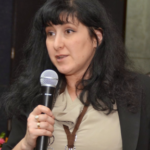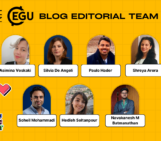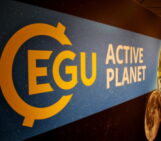
The EGU Natural Hazards Division now has a new Policy Officer to help promote evidence-based policy-making and support members of the Division in participating in policy-making processes. The Policy Officer aims to bridge between the Division and the EGU Science for Policy Working Group, helping to ensure that evidence-based decisions are made in the policy-making processes related to our areas of expertise.
So here I am, the new Policy Officer for the Natural Hazards Division. My name is Antonella Peresan, and I am a senior seismologist at the National Institute of Oceanography and Applied Geophysics – OGS. As the appointed Policy Officer, I will work with the staff of the Natural Hazards Division as well as with the EGU Science for Policy Working Group, which aims to foster closer collaboration between the geoscience community and policymakers, highlight policy-relevant findings from EGU scientists, and support evidence-based policy.

Antonella Peresan
Now, allow me to give you a brief introduction to who I am and what I do in science and research. I conduct interdisciplinary research focusing mainly (but not only) on the following areas: seismological research on issues related to time-dependent seismic hazard assessment and the study of multiple hazards, from tsunamis to seismically induced landslides. I also carry out capacity-building and knowledge transfer activities for the implementation of seismological research results aimed at the mitigation of related risks, with particular attention to emerging and developing countries. I believe that the effective interaction between scientists and stakeholders plays a key role towards improved comprehension and mitigation of impacts from natural hazards. Science-policy and collaboration with the key actors involved are essential not only to promote mutual understanding and implementation of results from scientific research for the benefit of society but also to stimulate future research activities by posing new challenges to our knowledge (namely, what is actually needed but we still don’t know).
If you want to connect and engage in European policy-making, here are some areas I could potentially help you with:
- create a connection with EU bodies and individual policymakers working on NH-relevant issues
- help coordinate themed/division-specific Science for Policy webinars relevant to NH-Division members
- help coordinate groups of NH-Division members interested in tackling a specific policy problem when it arises (e.g. via an EU consultation)
- help put forward members who would like to start engaging more in Europe’s policy-making processes or share opportunities to join groups who are already engaging, such as the EGU’s new Task Force, which will be established in early 2025
- forward information about relevant and upcoming policies that division members may be interested in contributing to. Likewise, EGU members can highlight policy processes and legislation that might interest the wider EGU community!
If you want to learn more about science for policy and connect with others working on the science-policy interface, you can join the EGU Division Policy Officer and Point of Policy Contact Slack Group. As part of this group, you can share your own science-policy experience, ask questions, join discussions, and learn about opportunities to start engaging in European policy-making!
We will also be hosting a splinter meeting with the Policy Officers and the Points of Policy Contacts of the other Divisions at the EGU24 General Assembly. Join us to meet department members interested in science for policy and create with us a network of engaged members: https://meetingorganizer.copernicus.org/EGU24/session/50818
Post edited by Asimina Voskaki and Silvia De Angeli





PK Khan
Great!!!
Umesh Prasad Verma
Climate extremity and stern actions will now be gaining it’s acceleration in next decades at its height.Our resort n efforts are now only to sit on the conference of policy making tough to cope in reality